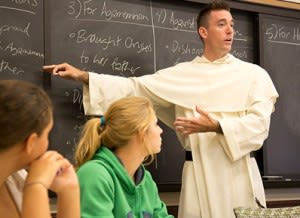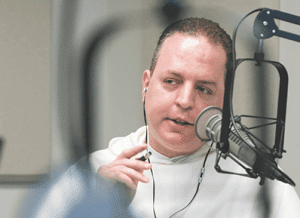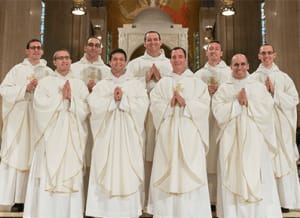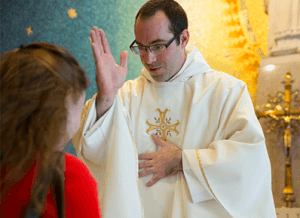Q&A With Curtis Martin

Photo: Curtis Martin is the founder of FOCUS (Fellowship of Catholic University Students). Photo courtesy of FOCUS.
Q&A With Curtis Martin
By Blackfriars Staff
BlackFriars: Congratulations on 25 years of the founding of FOCUS! Your vision and your commitment to forming young people on college campuses has borne much fruit. What were the indicators in the prevailing culture that led you to found FOCUS 25 years ago? And what are the challenges in the culture you see today?
Curtis Martin: One thing that hasn’t changed is that college is a great place to lose your faith if you’re not careful. It was that way 25 years ago and it’s that way today. If we have a spiritual plan, we can thrive; unfortunately, most young people don’t. Both myself and my wife are prodigal Catholics. By the time we got to college, we met evangelical Protestants who were present on the college campus, but the Catholic Church was not. Each of us independently had an intense conversion back to faith in Christ, which temporarily left us with faith in Christ but not in the Church and the sacraments. We both found our way back to the Catholic Church by the grace of God and met after that, and our earliest conversations were, “Why do you have to leave the Catholic Church to find Jesus Christ?” Most everyone knows someone who was raised Catholic who is now evangelical because of their time on college campuses. Our competitors and our opposition in the culture wars are trying harder. The money that evangelicals put into campus ministry was staggering compared to the Catholic Church. And the number that Planned Parenthood is putting into college campuses is staggering compared to evangelicals. Essentially, other people want our kids more than we do. So, we asked ourselves, was God calling us to offer a response? FOCUS is the result of that.
What has changed since that time is that the Catholic Church has awakened to the need on college campuses. The good news is we win every time we show up. And we lose by forfeit. When the Catholic Church shows up with a vibrant, engaging, sacramental presence, it’s wildly successful. And in FOCUS’s case, we see our job as lay Catholics is to draw students back to the priesthood and back to the sacraments. So, we really don’t do most of the work. We build a bridge. But it’s really the priests—it just shows the power of the priesthood—it’s faithful priests who are joyful about their priesthood that lead to fruitful Newman Centers and chaplaincies every time. And if we can reach students and bring them back to priests like that…there will be fruit.
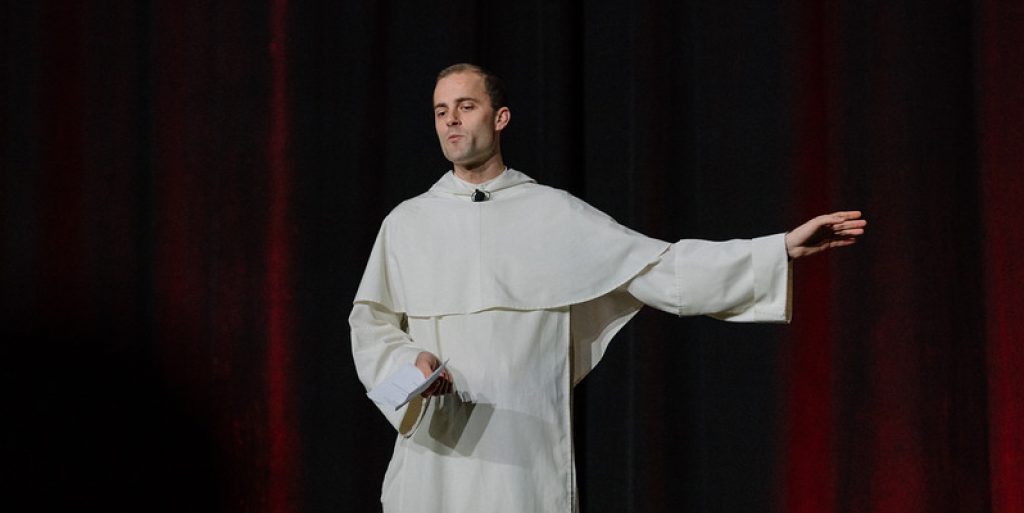
Fr. Gregory Pine, O.P., speaking at a recent SEEK conference. Photo courtesy of FOCUS.
BlackFriars: FOCUS missionaries work closely with Dominican friars on a number of college campuses. How has the presence of the Dominicans impacted the students you serve?
Curtis Martin: None of the authentic longings of the soul are being met by the average university today. Intellectually, the university is filled with wokeness and deconstruction. People are taught what to think but not how to think, so students are not asking the right questions to get the right answers and the Dominicans have the best patrimony to address this—they really are perfectly situated to address the intellectual vacuum on most campuses. They meet the spiritual one as well (the sacramental and the human). FOCUS has been very blessed to be of service to the Dominican friars and there’s much more work to be done.
BlackFriars: You recently quoted a statistic that 93% of Catholics raised in the faith leave the Catholic faith by the age of 23. How do Dominican friars on college campuses help stem that tide?
Curtis Martin: The culture has never been more loud and more godless. We’ve had godless cultures before, but this one wins. The pornography industry alone is a bigger industry than all major sports teams put together. This culture comes at you. Families are in crisis. Couples aren’t having children so they don’t have a lot of brothers and sisters to play with. And if you do have siblings, you probably have your own room, your own tv, and your own devices. It’s wildly isolating. While the statistic is accurate by the age of 23, the reality of the matter is our young people are getting into serious spiritual danger at age 8, 9, and 10. And it usually happens within 24 hours of parents giving their kid a cellphone. We go on mission trips with our college students and it’s the first time they haven’t had a cellphone in a decade and the first time they’ve gone a week without pornography. So, when you remove that distraction and you get them close to the poor so they can encounter Christ in the poor, and you get them close to a priest and the sacraments, lives are changed. When we’re seeing young people leaving the Church in their early 20s it’s really a last step of a war that has been going on for a decade for those young souls and the Church is ill- prepared to respond. But the renewal in the Dominican Order shows there are real pockets of vibrancy in the Church able to respond. And the young vocations in your province indicate that the Dominican community is rendering itself relevant to young people—so that’s an important reality.
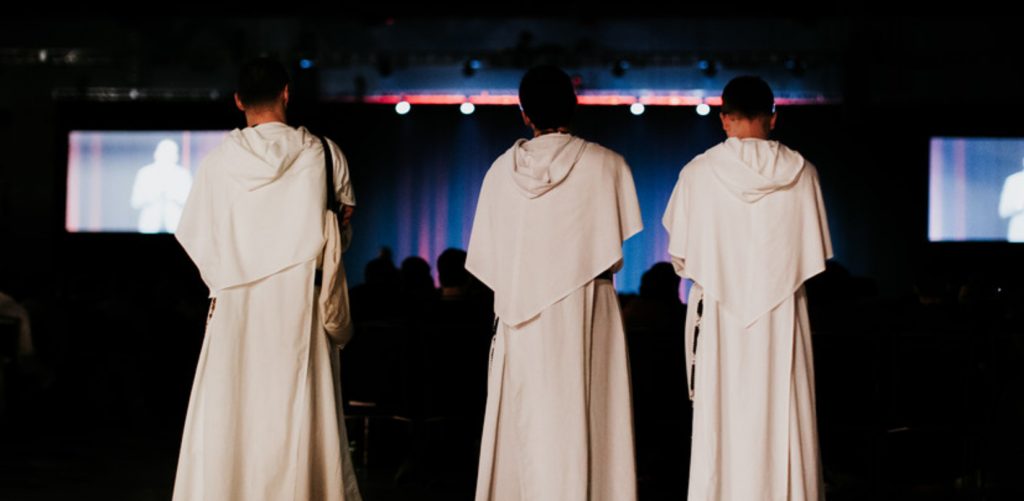
Dominican Friars at a recent SEEK conference. Photo courtesy of FOCUS.
BlackFriars: Bishop Barron has said that “Dominicans are in the truth business.” Why is the mission to preach truth more important than ever on college campuses and, in your view, how does their training help meet this need for clarity in a very confused age?
Curtis Martin: St. Thomas Aquinas’ Summa Theologica is his most famous work but he also wrote Summa Contra Gentiles which is an articulation of the faith to nonbelievers. And, apart from these two great works, he spent most of his time breaking open the scriptures, and now those writings are being translated into English. We need to know the truth with great clarity as expressed in the Summa Theologica; we need to have a heart for those who don’t know the truth as found in the Summa Contra Gentiles; and we need to speak to them of God as found in Thomas’ words on scripture. This is the patrimony of the Dominicans (and of course prayer and the Rosary), but we are in an intellectual crisis right now where people don’t see things clearly. My friend Dr. Ted Sri says our Catholic faith is like a lens—it’s not what you look at, but what you look through. We live in a culture that doesn’t have healthy lenses. The Dominicans have always been in the habit of sharing with people not just what to think, but how to think about everything. They provide that lens. Dominic was one of the most gifted preachers of his age. He wasn’t having success evangelizing the people he was working with, even though he was winning all the arguments, he was not winning their hearts. And Mary appears to him and says, essentially, the problem is their hearts. You need to pray for them. With the Rosary, seeing our Lord’s life through the Blessed Mother’s eyes, becomes another lens. If you spend 20 minutes praying the Rosary, you’ve spent that time thinking about the life of Christ. That’s a good thing for your soul. When you look at Jesus, and the dynamism of salvation history, it shapes the way we think about everything. And that’s the comprehensive project that the Dominicans have always been about.
BlackFriars: College students are in a colossal identity crisis. What do you think this crisis stems from? And how are Dominicans positioned to help students discover who they are?
Curtis Martin: There is nothing more natural to the human person than “relationship”. The problem is we live in a very unnatural world. The first relationship any of us know is that of a son or a daughter and our relationship with our earthly parents should point to the Blessed Trinity, particularly to God the Father. But our society is disordered and broken and that iconic reality of the family doesn’t function the way it was meant to, so young people today grow up with deep wounds from their family of origin. The second relationship is brother and sister but because of contraception there is no experience of brotherly love. The average person in Italy today doesn’t have a brother, doesn’t have a sister, doesn’t have a first cousin because they’re only children of only children. There’s no lived experience of brotherly love. And anyone who’s been in a family knows that the reality of brotherly love is complicated—that ability to fight and to love in a nonsexual way is missing from our culture. It’s been reduced to erotic love which is the next form of love, marital love as husband and wife. But we skip the son or daughter. We skip the brother or sister. There’s no foundation. The Catholic Church, with its anthropology and theology of the body, is the only answer here. But the problem with theology of the body and Catholic anthropology is it involves detailed and intricate philosophical language that has to be translated for the average person. The average person is not going to understand the words we use. And that’s where Dominicans have always been great— taking this truth, and without changing it, rendering it accessible. There’s a rich history of the Dominicans and their ability to do this. Just like in the 1960s there was rebellion against the Church’s teaching on birth control and for a couple decades there were only intricate philosophical and anthropological arguments so people were stuck—either they were trying to be faithful but didn’t know how to explain the Church’s teaching, or they decided they were not going to be faithful. We are in a similar situation today with gender. There is no answer right now except ones that are deeply theological and deeply philosophical and the Dominicans (again) are uniquely positioned to articulate fundamental principles and then render a translation that the ordinary person can make sense of and that the world is desperately looking for.
Your support helps form friars capable of reaching today’s college students through the unity of Faith and Reason!
The Dominican Foundation of Dominican Friars Province of St. Joseph, Inc. is a NY State tax-exempt corporation under section 501(c) (3) of the Internal Revenue Code, with
Tax ID # 26-3273636.


